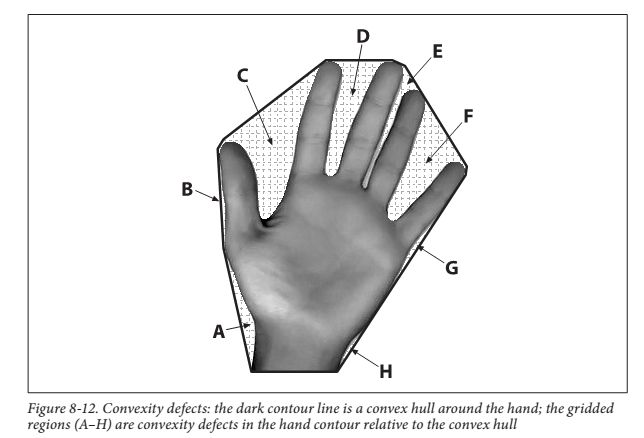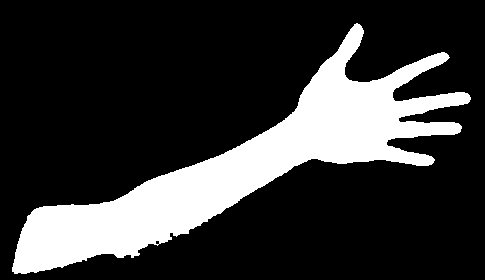用opencv检测convexity defects
一 概念:
Convexity hull, Convexity defects
如上图所示,黑色的轮廓线为convexity hull, 而convexity hull与手掌之间的部分为convexity defects. 每个convexity defect区域有四个特征量:起始点(startPoint),结束点(endPoint),距离convexity hull最远点(farPoint),最远点到convexity hull的距离(depth)。
二.OpenCV中的相关函数
void convexityDefects(InputArray contour, InputArray convexhull, OutputArrayconvexityDefects)
参数:
coutour: 输入参数,检测到的轮廓,可以调用findContours函数得到;
convexhull: 输入参数,检测到的凸包,可以调用convexHull函数得到。注意,convexHull函数可以得到vector<vector<Point>>和vector<vector<int>>两种类型结果,这里的convexhull应该为vector<vector<int>>类型,否则通不过ASSERT检查;
convexityDefects:输出参数,检测到的最终结果,应为vector<vector<Vec4i>>类型,Vec4i存储了起始点(startPoint),结束点(endPoint),距离convexity hull最远点(farPoint)以及最远点到convexity hull的距离(depth)
三.代码
//http://docs.opencv.org/doc/tutorials/imgproc/shapedescriptors/hull/hull.html
//http://www.codeproject.com/Articles/782602/Beginners-guide-to-understand-Fingertips-counting
#include "opencv2/highgui/highgui.hpp"
#include "opencv2/imgproc/imgproc.hpp"
#include <iostream>
#include <stdio.h>
#include <stdlib.h>
using namespace cv;
using namespace std;
Mat src; Mat src_gray;
int thresh = 100;
int max_thresh = 255;
RNG rng(12345);
/// Function header
void thresh_callback(int, void* );
/** @function main */
int main( int argc, char** argv )
{
/// Load source image and convert it to gray
src = imread( argv[1], 1 );
/// Convert image to gray and blur it
cvtColor( src, src_gray, CV_BGR2GRAY );
blur( src_gray, src_gray, Size(3,3) );
/// Create Window
char* source_window = "Source";
namedWindow( source_window, CV_WINDOW_AUTOSIZE );
imshow( source_window, src );
createTrackbar( " Threshold:", "Source", &thresh, max_thresh, thresh_callback );
thresh_callback( 0, 0 );
waitKey(0);
return(0);
}
/** @function thresh_callback */
void thresh_callback(int, void* )
{
Mat src_copy = src.clone();
Mat threshold_output;
vector<vector<Point> > contours;
vector<Vec4i> hierarchy;
/// Detect edges using Threshold
threshold( src_gray, threshold_output, thresh, 255, THRESH_BINARY );
/// Find contours
findContours( threshold_output, contours, hierarchy, CV_RETR_TREE, CV_CHAIN_APPROX_SIMPLE, Point(0, 0) );
/// Find the convex hull object for each contour
vector<vector<Point> >hull( contours.size() );
// Int type hull
vector<vector<int>> hullsI( contours.size() );
// Convexity defects
vector<vector<Vec4i>> defects( contours.size() );
for( size_t i = 0; i < contours.size(); i++ )
{
convexHull( Mat(contours[i]), hull[i], false );
// find int type hull
convexHull( Mat(contours[i]), hullsI[i], false );
// get convexity defects
convexityDefects(Mat(contours[i]),hullsI[i], defects[i]);
}
/// Draw contours + hull results
Mat drawing = Mat::zeros( threshold_output.size(), CV_8UC3 );
for( size_t i = 0; i< contours.size(); i++ )
{
Scalar color = Scalar( rng.uniform(0, 255), rng.uniform(0,255), rng.uniform(0,255) );
drawContours( drawing, contours, i, color, 1, 8, vector<Vec4i>(), 0, Point() );
drawContours( drawing, hull, i, color, 1, 8, vector<Vec4i>(), 0, Point() );
// draw defects
size_t count = contours[i].size();
std::cout<<"Count : "<<count<<std::endl;
if( count < 300 )
continue;
vector<Vec4i>::iterator d =defects[i].begin();
while( d!=defects[i].end() ) {
Vec4i& v=(*d);
//if(IndexOfBiggestContour == i)
{
int startidx=v[0];
Point ptStart( contours[i][startidx] ); // point of the contour where the defect begins
int endidx=v[1];
Point ptEnd( contours[i][endidx] ); // point of the contour where the defect ends
int faridx=v[2];
Point ptFar( contours[i][faridx] );// the farthest from the convex hull point within the defect
int depth = v[3] / 256; // distance between the farthest point and the convex hull
if(depth > 20 && depth < 80)
{
line( drawing, ptStart, ptFar, CV_RGB(0,255,0), 2 );
line( drawing, ptEnd, ptFar, CV_RGB(0,255,0), 2 );
circle( drawing, ptStart, 4, Scalar(255,0,100), 2 );
circle( drawing, ptEnd, 4, Scalar(255,0,100), 2 );
circle( drawing, ptFar, 4, Scalar(100,0,255), 2 );
}
/*printf("start(%d,%d) end(%d,%d), far(%d,%d)\n",
ptStart.x, ptStart.y, ptEnd.x, ptEnd.y, ptFar.x, ptFar.y);*/
}
d++;
}
}
/// Show in a window
namedWindow( "Hull demo", CV_WINDOW_AUTOSIZE );
imshow( "Hull demo", drawing );
//imwrite("convexity_defects.jpg", drawing);
}
四.结果
原图
Convexity defects图,蓝色点是convexity defects的起始点和结束点,红色点是最远点。(为什么有的起始点和结束点中间没有最远点呢?因为只画出了depth范围在20到80之间的convexity defects的起始点、结束点和最远点)
五.参考
[1] Gary Bradski, Adrian Kaehler. Learning OpenCV: Computer Vision with the OpenCV Library. Page258~259.
[2] http://docs.opencv.org/doc/tutorials/imgproc/shapedescriptors/hull/hull.html
[3] http://www.codeproject.com/Articles/782602/Beginners-guide-to-understand-Fingertips-counting

